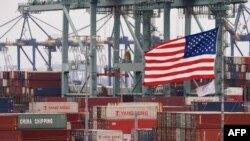The Trump administration said on Tuesday that no major trading partner met its currency manipulation criteria but nine countries, including China, required close attention as Washington presses tariffs and negotiations to address trade deficits.
The Treasury Department, in a semi-annual report to Congress, said it reviewed the policies of an expanded set of 21 major U.S. trading partners and found that nine required close attention due to currency practices: China, Germany, Ireland, Italy, Japan, South Korea, Malaysia, Singapore, and Vietnam.
"No major U.S. trading partner met the relevant 2015 legislative criteria for enhanced analysis" as a currency manipulator, the department said in a statement.
President Donald Trump has imposed tariffs on $200 billion worth of Chinese imports and begun the process of imposing tariffs on another $300 billion in Chinese goods.
Talks to end the trade dispute between the two countries collapsed earlier this month, with the two sides in a stalemate over U.S. demands that China change its policies to address a number of key U.S. grievances, including theft of intellectual property and subsidies for state enterprises.
The Treasury Department said Washington believes direct foreign exchange intervention by the People's Bank of China has been limited in the past year.
"Treasury will continue its enhanced bilateral engagement with China regarding exchange rate issues, given that the RMB (yuan) has fallen against the dollar by 8 percent over the last year in the context of an extremely large and widening bilateral trade surplus," Secretary Steven Mnuchin said in the statement.
China needs to aggressively address market-distorting forces, including subsidies and state-owned enterprises, the Treasury statement said. Improved economic fundamentals would support a stronger yuan and help reduce China’s trade surplus with the United States, it said.





